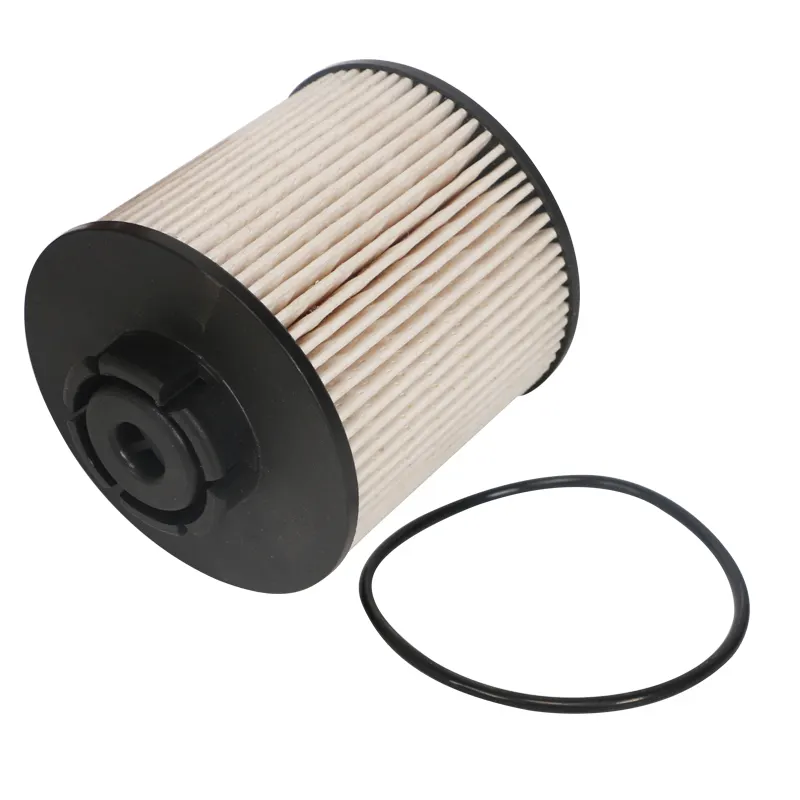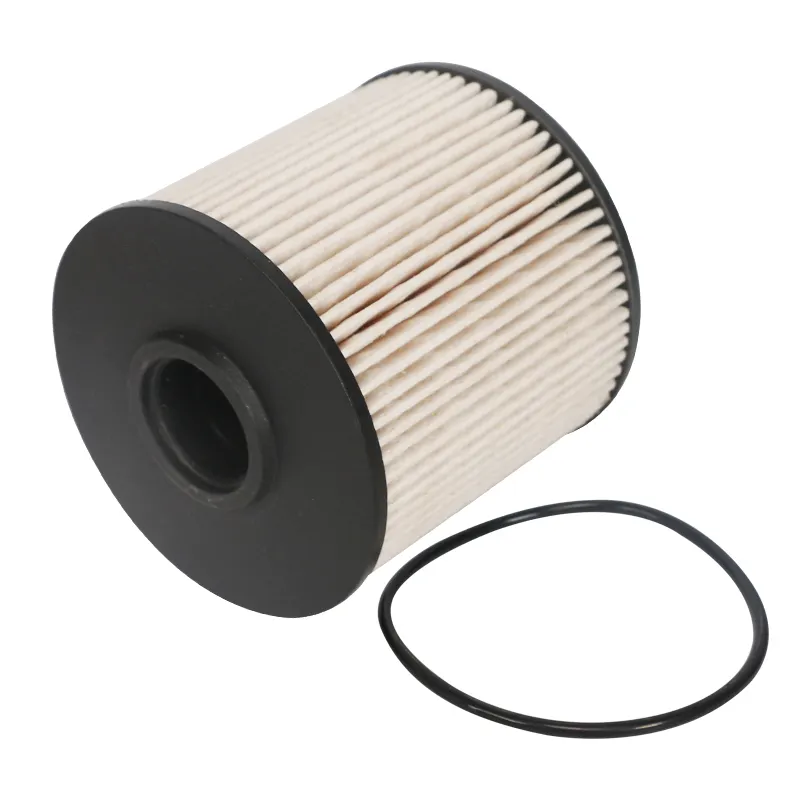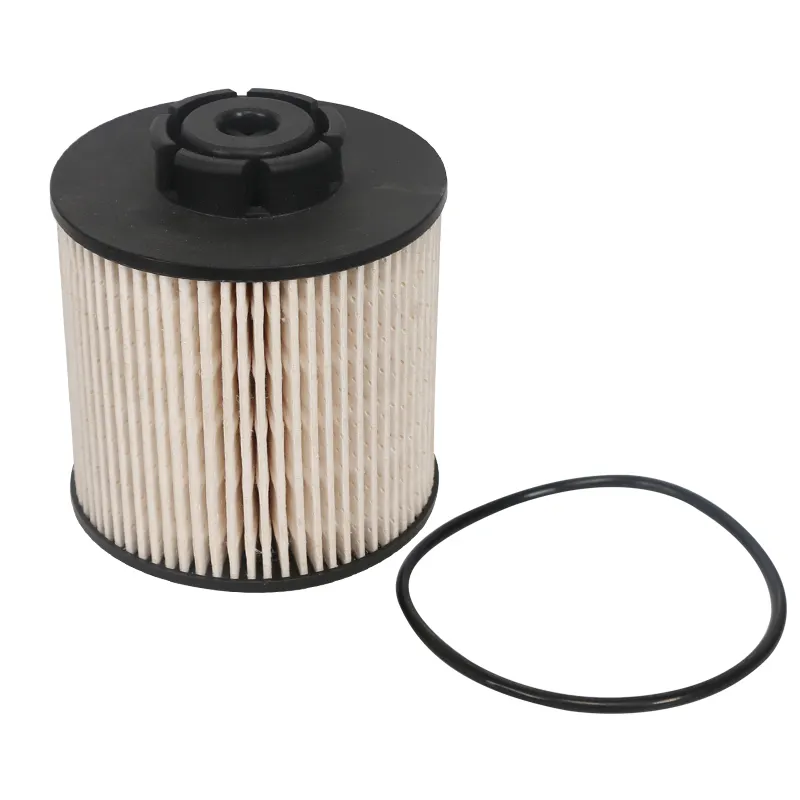8月 . 29, 2025 01:00 リストに戻る
Premium Fuel Filters for Optimal Engine Performance & Life
Industry Trends and the Critical Role of Fuel Filters
The global automotive and industrial sectors are witnessing unprecedented shifts, driven by stringent emission regulations, the advent of alternative fuels, and an escalating demand for operational efficiency and extended service intervals. Central to addressing these challenges is the performance of the fuel filter. As engines become more sophisticated, featuring high-pressure common rail (HPCR) systems and precise fuel injection, the absolute necessity for ultra-clean fuel has magnified. Contaminants, even microscopic ones, can cause significant wear and tear, leading to costly damage, reduced fuel efficiency, and increased emissions.
Current industry trends highlight a move towards multi-stage filtration systems, advanced synthetic media, and modular designs that simplify maintenance and reduce environmental impact. The market for fuel filter technology is evolving rapidly, with a particular focus on enhancing filtration efficiency, increasing dirt-holding capacity, and improving water separation capabilities, especially for diesel applications. Furthermore, the integration of sensors for real-time monitoring of filter condition and fuel quality is becoming standard, offering predictive maintenance capabilities crucial for heavy-duty applications and remote operations. Manufacturers are also increasingly prioritizing sustainable materials and manufacturing processes to align with global environmental mandates. The demand for robust car fuel filter and automobile fuel filter solutions continues to grow, adapting to diverse engine technologies and operating environments worldwide.
The Meticulous Manufacturing Process of High-Performance Fuel Filters
The production of a high-quality fuel filter is a complex, multi-stage process that combines advanced material science with precision engineering. Adherence to strict international standards such as ISO 9001 and IATF 16949 for automotive applications is fundamental to ensuring product reliability and performance.
Process Flow Overview:
- Material Selection & Preparation: Begins with selecting premium-grade filter media (e.g., cellulose, synthetic polymers, glass fiber composites) optimized for specific micron ratings and fluid compatibility. Housing materials, often high-strength steel or aluminum fuel filter alloys, are chosen for corrosion resistance and structural integrity. Elastomers for seals are selected for chemical resistance and temperature stability.
- Media Pleating & Assembly: Filter media is precisely pleated to maximize surface area within a compact volume. Techniques like "M-pleating" or "star-pleating" are employed to ensure uniform flow distribution and dirt-holding capacity. Advanced pleating machinery ensures consistent pleat depth and spacing.
- Component Fabrication: Housing components, end caps, and internal structures undergo various manufacturing processes. For spin on fuel filter types, precision stamping and deep drawing are common. Aluminum fuel filter housings might involve high-pressure die casting or CNC machining from solid billets to achieve critical dimensions and surface finishes. Forging may be used for specific, high-stress connection components.
- Bonding & Sealing: The pleated media is bonded to end caps using specialized adhesives (e.g., polyurethane, epoxy) or thermal bonding techniques to prevent bypass. Gaskets and O-rings are precisely fitted to ensure a leak-proof seal under varying pressures and temperatures.
- Final Assembly: All internal components – media, spring, anti-drain back valve, bypass valve (if applicable) – are carefully assembled into the housing. Robotic assembly systems are often employed for consistency and speed.
- Quality Control & Testing: Each fuel filter undergoes rigorous testing. This includes burst pressure testing (to ensure housing integrity), leakage testing (e.g., using helium detection), flow restriction testing, and multi-pass efficiency testing per ISO 16889 or SAE J1858 standards to confirm filtration efficiency and dirt-holding capacity. Visual inspections are performed throughout the process.
- Packaging: Filters are carefully packaged to prevent contamination and damage during transit, ready for distribution.
Key Advantages in Typical Application Scenarios:
- Enhanced Engine Longevity: Superior filtration efficiency (e.g., 99.9% at 4 microns) significantly reduces abrasive wear on fuel injectors and pumps, extending engine service life and reducing maintenance costs. This is particularly vital in heavy-duty diesel engines.
- Corrosion Resistance: High-grade housing materials and advanced coatings prevent rust and degradation, even when exposed to harsh environmental conditions or corrosive fuel additives, ensuring structural integrity over the filter's service life.
- Optimized Fuel Economy: A well-performing fuel filter ensures consistent, clean fuel delivery, allowing the engine to operate at peak efficiency, thereby contributing to better fuel economy and reduced operational costs.
- Compliance & Emissions Reduction: By protecting sensitive fuel system components, these filters ensure precise fuel injection, which is critical for meeting stringent emission standards (e.g., Euro VI, EPA Tier 4).
- Extended Service Life: Advanced media with high dirt-holding capacity (DHC) allows for longer service intervals, reducing downtime and lowering total cost of ownership for fleet operators and industrial users.

Technical Specifications and Performance Parameters
Understanding the intricate technical specifications of a fuel filter is paramount for B2B decision-makers. Key parameters dictate its suitability for specific engine types, fuel systems, and operational environments. Our OEM 0000901251 car fuel filter is engineered to meet or exceed original equipment standards.
Structure and Design:
The featured product, a spin on fuel filter, typically consists of a robust metal or aluminum fuel filter housing, a pleated filter media element, an anti-drain back valve, and a bypass valve. The anti-drain back valve prevents fuel from draining out of the filter when the engine is shut off, ensuring quick starts. The bypass valve, often spring-loaded, allows unfiltered fuel to reach the engine if the filter becomes severely clogged, preventing fuel starvation (though this situation should be avoided through timely replacement). Advanced designs also incorporate water separators, often with a clear bowl and drain cock, to remove free water from diesel fuel, which is crucial for preventing microbial growth and corrosion.
Product Specification Table: Car Fuel Filter OEM 0000901251
| Parameter | Specification |
|---|---|
| OEM Part Numbers | 0000901251, A9060920505, A0000901251 |
| Filter Type | Spin-On Fuel Filter (Diesel) |
| Filtration Efficiency | >98% @ 5 micron (Beta Ratio β₅ > 50) |
| Water Separation Efficiency | >95% (SAE J1839 compliant) |
| Flow Rate Capacity | Up to 300 L/hr |
| Max Operating Pressure | 10 bar (145 psi) |
| Burst Pressure | > 25 bar (362 psi) |
| Service Life Expectancy | Up to 50,000 km or 500 operating hours (dependent on fuel quality and operating conditions) |
| Operating Temperature Range | -40°C to +100°C |
| Housing Material | Steel, corrosion-resistant coated |
| Filter Media | Multi-layer synthetic blend for optimal efficiency and dirt-holding capacity |
Real-World Application Scenarios and Proven Impact
The robust design and high performance of our fuel filter solutions ensure reliable operation across a multitude of demanding application scenarios, from commercial vehicle fleets to specialized industrial machinery.
Typical Application Scenarios:
- Commercial Trucking & Logistics: Ensuring optimal performance and longevity for diesel engines in long-haul trucks, delivering consistent fuel quality even with varying fuel sources.
- Construction & Mining Equipment: Protecting high-value engines in excavators, bulldozers, and mining trucks operating in harsh, dusty environments where fuel contamination risks are high.
- Agricultural Machinery: Safeguarding tractor engines and other farm equipment against impurities often found in bulk-stored fuels, crucial during planting and harvesting seasons.
- Marine Vessels: Providing critical protection for marine diesel engines, where water contamination in fuel is a persistent challenge due to condensation and fuel handling.
- Power Generation: Maintaining the efficiency and reliability of diesel generators used for backup power or primary power in remote locations.
Customer Feedback & Service Case Details:
A major fleet operator based in the Middle East faced recurring issues with injector fouling and premature fuel pump wear in their heavy-duty truck fleet due to the inconsistent quality of locally sourced diesel fuel. After implementing our high-efficiency fuel filter (specifically, an upgraded version of the OEM 0000901251 series designed for higher water separation), they observed a remarkable improvement. Over an 18-month period, fuel injector replacement rates dropped by 45%, and fuel pump failures were virtually eliminated. This directly translated into an estimated 15% reduction in unplanned downtime and significant savings in parts and labor, validating the superior protection offered by our advanced filtration technology.
Another instance involves an OEM partner integrating our automobile fuel filter as a standard component in their new line of agricultural sprayers. The feedback highlighted the filter's robust construction and consistent performance under severe vibrational stress and exposure to aggressive agricultural chemicals, allowing for uninterrupted operation during critical field work. Our filters consistently deliver operational reliability and cost savings, underscoring our commitment to practical, effective solutions.

Unwavering Technical Advantages and Innovation
Our leadership in fuel filter technology is built on a foundation of continuous innovation and a commitment to engineering excellence. We leverage cutting-edge materials and design methodologies to deliver superior performance.
Key Technical Advantages:
- Advanced Multi-Layer Media: Our filter elements utilize a proprietary blend of synthetic and cellulose fibers, engineered into a multi-layer structure. This design provides progressive filtration, where coarser particles are captured in outer layers and finer particles in inner layers, significantly increasing dirt-holding capacity (DHC) and extending service life without compromising flow.
- Exceptional Water Separation: For diesel applications, effective water separation is critical. Our filters employ hydrophobic media and coalescing layers that efficiently separate both free and emulsified water, protecting sensitive fuel injection components from corrosion and cavitation damage. Testing consistently shows over 95% water removal efficiency.
- Robust Construction: Housings are constructed from high-strength steel or robust aluminum fuel filter alloys, often featuring epoxy coatings for enhanced corrosion resistance against aggressive fuels and environmental factors. Welded seams and crimped end caps ensure structural integrity under dynamic operating conditions and high pressures.
- Optimized Flow Dynamics: Internal design minimizes pressure drop across the filter while maintaining high filtration efficiency. This optimization prevents fuel starvation, especially in high-demand engine applications, contributing to consistent engine performance and fuel delivery.
- Chemical Compatibility: All materials, including filter media, seals, and housing coatings, are rigorously tested for compatibility with a wide range of fuels, including various diesel blends, biodiesel (B20, B100), and gasoline formulations, ensuring long-term durability and preventing material degradation.
Strategic Vendor Comparison for Optimal Filtration Solutions
Selecting the right fuel filter vendor is a strategic decision that impacts fleet uptime, operational costs, and engine longevity. Beyond mere price, key differentiators include product quality, innovation, support, and customization capabilities.
Key Comparison Factors:
- Filtration Performance: Look for verifiable data on efficiency (e.g., Beta ratio per ISO 16889) and dirt-holding capacity. Not all filters with the same micron rating perform equally.
- Material Quality: The longevity and performance of a fuel filter depend heavily on the quality of its media, housing, and seals. Premium synthetic media generally offers superior performance and service life.
- Certifications & Compliance: Ensure the vendor adheres to international quality management standards (ISO 9001, IATF 16949 for automotive) and product-specific testing standards (SAE, ISO fuel filtration standards).
- R&D and Innovation: A forward-thinking vendor invests in research and development to address emerging fuel challenges (e.g., biofuel compatibility, stricter emission norms).
- Customization & OEM Capabilities: For specific applications, the ability to tailor filter designs, media, and dimensions is a critical advantage.
- Technical Support & After-Sales Service: Access to expert technical guidance, prompt delivery, and strong warranty commitments are crucial for long-term partnerships.
Generic Fuel Filter Type Comparison:
| Feature | Spin-On Filter (e.g., Our OEM 0000901251) | Cartridge Filter Element | In-line Filter |
|---|---|---|---|
| Ease of Replacement | Very High (Unit replaced entirely) | Moderate (Element replaced within housing) | High (Small unit replaced) |
| Environmental Impact | Moderate (Entire unit disposal) | Lower (Only media disposal) | Low (Small unit, often plastic) |
| Pressure Rating | High (Robust metal housing) | Very High (Permanent housing) | Medium (Often plastic housing) |
| Filtration Performance Range | Excellent (Primary/Secondary) | Excellent (Primary/Secondary) | Good (Pre-filtration/Secondary) |
| Typical Application | Heavy-duty diesel, high-pressure common rail | Modern passenger vehicles, specific industrial | Gasoline engines, pre-filters |

Tailored Excellence: Custom Fuel Filter Solutions
While our standard product lines, including our high-performance automobile fuel filter, cover a vast array of applications, we recognize that certain industries and unique OEM requirements demand bespoke filtration solutions. Our engineering team specializes in collaborating with clients to develop custom fuel filter designs that precisely match specific performance, dimensional, and material specifications.
Our Customization Capabilities Include:
- Media Optimization: Developing specific filter media blends for unique fuel types (e.g., biofuels, aviation fuels), varied contaminant profiles, or extreme temperature ranges. This includes adjusting micron ratings and dirt-holding capacity.
- Housing Design: Custom geometries, port configurations, and material selections (e.g., specialized aluminum fuel filter alloys for weight reduction or extreme corrosion resistance) to integrate seamlessly into existing engine compartments or machinery.
- Integrated Functionality: Designing filters with integrated sensors for pressure differential, water detection, or fuel temperature, providing real-time data for predictive maintenance systems.
- Specialized Coatings & Treatments: Applying bespoke coatings for enhanced chemical resistance, improved heat dissipation, or anti-microbial properties, crucial for specific industrial or marine applications.
- Regulatory Compliance: Engineering solutions to meet specific regional or industry-specific regulatory requirements, including stringent environmental or safety standards.
Our process for customized solutions involves detailed consultation, advanced CAD modeling, rapid prototyping, and extensive validation testing in our state-of-the-art laboratory, ensuring that the final product not only meets but exceeds expectations.
Driving Trust and Reliability: Our Commitment to
Our dedication to Expertise, Experience, Authoritativeness, and Trustworthiness () underpins every fuel filter we produce and every service we provide. We believe that transparency and verifiable credentials are key to fostering long-term B2B partnerships.
Authoritativeness and Certifications:
- ISO 9001:2015 Certified: Our quality management system is certified to ISO 9001:2015, ensuring consistent product quality and process efficiency.
- IATF 16949 Compliant: For automotive applications, we adhere to the rigorous standards of IATF 16949, demonstrating our commitment to continuous improvement, defect prevention, and reduction of variation and waste in the supply chain.
- Decades of Service: With over 20 years in the filtration industry, we have amassed unparalleled experience and technical knowledge in designing and manufacturing high-performance filters.
- Key Partner Clients: We proudly serve as an OEM and aftermarket supplier to numerous leading automotive manufacturers and industrial equipment providers globally, a testament to our product quality and reliability.
- Extensive Test Data: All products undergo comprehensive in-house and third-party validation testing in accordance with international standards (e.g., ISO 16889, SAE J1858), with detailed performance reports available upon request.
Trustworthiness: FAQ, Logistics & Support
Frequently Asked Questions (FAQ):
- Q: How often should a fuel filter be replaced?
A: Replacement intervals vary by engine type, fuel quality, and operating conditions. For our OEM 0000901251, a general recommendation is every 50,000 km or 500 operating hours, but always refer to your vehicle/equipment manufacturer's guidelines. - Q: What are the signs of a clogged fuel filter?
A: Common symptoms include reduced engine performance, difficulty starting, engine stalling, poor acceleration, and decreased fuel efficiency. Modern systems may trigger a diagnostic trouble code. - Q: Are your filters compatible with biofuels?
A: Yes, our filters are engineered with materials compatible with common biofuel blends (e.g., up to B20 for diesel applications). For higher concentrations, please consult our technical team for specific product recommendations.
Lead Time & Fulfillment Details:
Standard lead times for high-volume orders typically range from 4-6 weeks, dependent on product type and customization. Urgent or smaller orders can often be expedited. We maintain robust inventory levels for popular OEM replacement parts like the Car 燃料フィルター OEM 0000901251, enabling faster dispatch. Our logistics team works with a global network of freight partners to ensure efficient and timely delivery worldwide.
Warranty Commitments:
We stand behind the quality of our products with a comprehensive warranty against defects in materials and workmanship for a period of 12 months from the date of installation or 24 months from the date of purchase, whichever comes first. Specific warranty terms may vary for custom solutions or high-volume OEM agreements.
Customer Support Information:
Our dedicated technical support team is available to assist with product selection, application queries, troubleshooting, and warranty claims. You can reach us via phone at [Insert Phone Number] or email at [Insert Email Address]. Our online portal also provides access to product datasheets, installation guides, and FAQs.
References:
- ISO 16889: Hydraulic fluid power – Filters – Multi-pass method for evaluating filtration performance of a filter element.
- SAE J1858: Fuel Filter Test Procedures.
- Diesel Fuel Filter and Fuel/Water Separator Technology. Society of Automotive Engineers.
- Fuel System Contamination: Causes, Effects, and Prevention. Journal of Lubrication Engineering.
- IATF 16949: Quality management system for the automotive industry.
これが最後の記事です
-
Premium Fuel Filters for Optimal Engine Performance & Life
ニュースAug.29,2025
-
Premium China Brand Car Air Filters | High Performance & Value
ニュースAug.28,2025
-
Annaite: Where Diesel Filter Passion Ignites
ニュースAug.23,2025
-
Fuel Filter Extreme Sports: Mud Bogging Champions
ニュースAug.23,2025
-
Annaite Air Filters: Qinghe Ingenuity, Pure Air Guaranteed
ニュースAug.23,2025
-
Air Filters Composing Ambient Dust Symphonies
ニュースAug.23,2025


